- Home
- George Eliot
Felix Holt Page 11
Felix Holt Read online
Page 11
He was meditating on the text for his Sunday morning sermon: ‘And all the people said, Amen’2 – a mere mustard-seed of a text, which had split at first only into two divisions, ‘What was said’, and ‘Who said it’; but these were growing into a many-branched discourse, and the preacher’s eyes dilated, and a smile played about his mouth till, as his manner was, when he felt happily inspired, he had begun to utter his thoughts aloud in the varied measure and cadence habitual to him, changing from a rapid but distinct undertone to a loud emphatic rallentando.3
‘My brethren, do you think that great shout was raised in Israel by each man’s waiting to say “amen” till his neighbours had said amen? Do you think there will ever be a great shout for the right – the shout of a nation as of one man, rounded and whole, like the voice of the archangel that bound together all the listeners of earth and heaven – if every Christian of you peeps round to see what his neighbours in good coats are doing, or else puts his hat before his face that he may shout and never be heard? But this is what you do: when the servant of God stands up to deliver his message, do you lay your souls beneath the Word as you set out your plants beneath the falling rain? No; one of you sends his eyes to all corners, he smothers his soul with small questions, “What does brother Y. think?” “Is this doctrine high enough for brother Z.?” “Will the church members be pleased?” And another –’
Here the door was opened, and old Lyddy, the minister’s servant, put in her head to say, in a tone of despondency, finishing with a groan, ‘Here is Mrs Holt wanting to speak to you; she says she comes out of season, but she’s in trouble.’
‘Lyddy,’ said Mr Lyon, falling at once into a quiet conversational tone, ‘if you are wrestling with the enemy, let me refer you to Ezekiel the thirteenth and twenty-second, and beg of you not to groan. It is a stumbling-block and offence to my daughter; she would take no broth yesterday, because she said you had cried into it. Thus you cause the truth to be lightly spoken of, and make the enemy rejoice. If your face-ache gives him an advantage, take a little warm ale with your meat – I do not grudge the money.’
‘If I thought my drinking warm ale would hinder poor dear Miss Esther from speaking light – but she hates the smell of it.’
‘Answer not again, Lyddy, but send up Mistress Holt to me.’
Lyddy closed the door immediately.
‘I lack grace to deal with these weak sisters,’ said the minister, again thinking aloud, and walking. ‘Their needs lie too much out of the track of my meditations, and take me often unawares. Mistress Holt is another who darkens counsel by words without knowledge, and angers the reason of the natural man. Lord, give me patience. My sins were heavier to bear than this woman’s folly. Come in, Mistress Holt, come in.’
He hastened to disencumber a chair of Matthew Henry’s Commentary,4 and begged his visitor to be seated. She was a tall elderly woman, dressed in black, with a light-brown front5 and a black band over her forehead. She moved the chair a little and seated herself in it with some emphasis, looking fixedly at the opposite wall with a hurt and argumentative expression. Mr Lyon had placed himself in the chair against his desk, and waited with the resolute resignation of a patient who is about to undergo an operation. But his visitor did not speak.
‘You have something on your mind, Mistress Holt?’ he said, at last.
‘Indeed I have, sir, else I shouldn’t be here.’
‘Speak freely.’
‘It’s well known to you, Mr Lyon, that my husband, Mr Holt, came from the north, and was a member in Malthouse Yard long before you began to be pastor of it, which was seven year ago last Michaelmas. It’s the truth, Mr Lyon, and I’m not that woman to sit here and say it if it wasn’t true.’
‘Certainly, it is true.’
‘And if my husband had been alive when you’d come to preach upon trial, he’d have been as good a judge of your gifts as Mr Nuttwood or Mr Muscat, though whether he’d have agreed with some that your doctrine wasn’t high enough, I can’t say. For myself, I’ve my opinion about high doctrine.’
‘Was it my preaching you came to speak about?’ said the minister, hurrying in the question.
‘No, Mr Lyon, I’m not that woman. But this I will say, for my husband died before your time, that he had a wonderful gift in prayer, as the old members well know, if anybody likes to ask ’em, not believing my words; and he believed himself that the receipt6 for the Cancer Cure, which I’ve sent out in bottles till this very last April before September as now is, and have bottles standing by me, – he believed it was sent him in answer to prayer; and nobody can deny it, for he prayed most regular, and read out of the green baize Bible.’
Mrs Holt paused, appearing to think that Mr Lyon had been successfully confuted, and should show himself convinced.
‘Has any one been aspersing your husband’s character?’ said Mr Lyon, with a slight initiative towards that relief of groaning for which he had reproved Lyddy.
‘Sir, they daredn’t. For though he was a man of prayer, he didn’t want skill and knowledge to find things out for himself; and that was what I used to say to my friends when they wondered at my marrying a man from Lancashire, with no trade nor fortune but what he’d got in his head. But my husband’s tongue ’ud have been a fortune to anybody, and there was many a one said it was as good as a dose of physic to hear him talk; not but what that got him into trouble in Lancashire, but he always said, if the worst came to the worst, he could go and preach to the blacks. But he did better than that, Mr Lyon, for he married me; and this I will say, that for age, and conduct, and managing –’
‘Mistress Holt,’ interrupted the minister, ‘these are not the things whereby we may edify one another. Let me beg of you to be as brief as you can. My time is not my own.’
‘Well, Mr Lyon, I’ve a right to speak to my own character; and I’m one of your congregation, though I’m not a church member, for I was born in the General Baptist connection: and as for being saved without works, there’s a many, I daresay, can’t do without that doctrine; but I thank the Lord I never needed to put myself on a level with the thief on the cross. I’ve done my duty, and more, if anybody comes to that; for I’ve gone without my bit of meat to make broth for a sick neighbour: and if there’s any of the church members say they’ve done the same, I’d ask them if they had the sinking at the stomach as I have; for I’ve ever strove to do the right thing, and more, for good-natured I always was; and I little thought, after being respected by everybody, I should come to be reproached by my own son. And my husband said, when he was a-dying – “Mary,” he said, “the Elixir, and the Pills, and the Cure will support you, for they’ve a great name in all the country round, and you’ll pray for a blessing on them.” And so I have done, Mr Lyon; and to say they’re not good medicines, when they’ve been taken for fifty miles round by high and low, and rich and poor, and nobody speaking against ’em but Dr Lukyn, it seems to me it’s a flying in the face of Heaven; for if it was wrong to take the medicines, couldn’t the blessed Lord have stopped it?’
Mrs Holt was not given to tears; she was much sustained by conscious unimpeachableness, and by an argumentative tendency which usually checks the too great activity of the lachrymal gland; nevertheless her eyes had become moist, her fingers played on her knee in an agitated manner, and she finally plucked a bit of her gown and held it with great nicety between her thumb and finger. Mr Lyon, however, by listening attentively, had begun partly to divine the source of her trouble.
‘Am I wrong in gathering from what you say, Mistress Holt, that your son has objected in some way to your sale of your late husband’s medicines?’
‘Mr Lyon, he’s masterful beyond everything, and he talks more than his father did. I’ve got my reason, Mr Lyon, and if anybody talks sense I can follow him; but Felix talks so wild, and contradicts his mother. And what do you think he says, after giving up his ’prenticeship, and going off to study at Glasgow, and getting through all the bit of money his father saved for his bring
ing-up – what has all his learning come to? He says I’d better never open my Bible, for it’s as bad poison to me as the pills are to half the people as swallow ’em. You’ll not speak of this again, Mr Lyon – I don’t think ill enough of you to believe that. For I suppose a Christian can understand the word o’ God without going to Glasgow, and there’s texts upon texts about ointment and medicine, and there’s one as might have been made for a receipt of my husband’s – it’s just as if it was a riddle, and Holt’s Elixir was the answer.’
‘Your son uses rash words, Mistress Holt,’ said the minister, ‘but it is quite true that we may err in giving a too private interpretation to the Scripture. The word of God has to satisfy the larger needs of His people, like the rain and the sunshine – which no man must think to be meant for his own patch of seed-ground solely. Will it not be well that I should see your son, and talk with him on these matters? He was at chapel, I observed, and I suppose I am to be his pastor.’
‘That was what I wanted to ask you, Mr Lyon. For perhaps he’ll listen to you, and not talk you down as he does his poor mother. For after we’d been to chapel, he spoke better of you than he does of most: he said you was a fine old fellow, and an old-fashioned Puritan – he uses dreadful language, Mr Lyon; but I saw he didn’t mean you ill, for all that. He calls most folks’ religion rottenness; and yet another time he’ll tell me I ought to feel myself a sinner, and do God’s will and not my own. But it’s my belief he says first one thing and then another only to abuse his mother. Or else he’s going off his head, and must be sent to a ’sylum. But if he writes to the North Loamshire Herald first, to tell everybody the medicines are good for nothing, how can I ever keep him and myself?’
‘Tell him I shall feel favoured if he will come and see me this evening,’ said Mr Lyon, not without a little prejudice in favour of the young man, whose language about the preacher in Malthouse Yard did not seem to him to be altogether dreadful. ‘Meanwhile, my friend, I counsel you to send up a supplication, which I shall not fail to offer also, that you may receive a spirit of humility and submission, so that you may not be hindered from seeing and following the Divine guidance in this matter by any false lights of pride and obstinacy. Of this more when I have spoken with your son.’
‘I’m not proud or obstinate, Mr Lyon. I never did say I was everything that was bad, and I never will. And why this trouble should be sent on me above everybody else – for I haven’t told you all. He’s made himself a journeyman7 to Mr Prowd the watchmaker – after all this learning – and he says he’ll go with patches on his knees, and he shall like himself the better. And as for his having little boys to teach, they’ll come in all weathers with dirty shoes. If it’s madness, Mr Lyon, it’s no use your talking to him.’
‘We shall see. Perhaps it may even be the disguised working of grace within him. We must not judge rashly. Many eminent servants of God have been led by ways as strange.’
‘Then I’m sorry for their mothers, that’s all, Mr Lyon; and all the more if they’d been well-spoken-on women. For not my biggest enemy, whether it’s he or she, if they’ll speak the truth, can turn round and say I’ve deserved this trouble. And when everybody gets their due, and people’s doings are spoke of on the house-tops, as the Bible says they will be, it’ll be known what I’ve gone through with those medicines – the pounding, and the pouring, and the letting stand, and the weighing – up early and down late – there’s nobody knows yet but One that’s worthy to know; and the pasting o’ the printed labels right side upwards. There’s few women would have gone through with it; and it’s reasonable to think it’ll be made up to me; for if there’s promised and purchased blessings, I should think this trouble is purchasing ’em. For if my son Felix doesn’t have a strait-waistcoat put on him, he’ll have his way. But I say no more. I wish you good morning, Mr Lyon, and thank you, though I well know it’s your duty to act as you’re doing. And I never troubled you about my own soul, as some do who look down on me for not being a church member.’
‘Farewell, Mistress Holt, farewell. I pray that a more powerful teacher than I am may instruct you.’
The door was closed, and the much-tried Rufus walked about again, saying aloud, groaningly,
‘This woman has sat under the Gospel all her life, and she is as blind as a heathen, and as proud and stiff-necked as a Pharisee; yet she is one of the souls I watch for. ’Tis true that even Sara, the chosen mother of God’s people, showed a spirit of unbelief,8 and perhaps of selfish anger; and it is a passage that bears the unmistakable signet, “doing honour to the wife or woman, as unto the weaker vessel”.9 For therein is the greatest check put on the ready scorn of the natural man.’
CHAPTER V
1ST CITIZEN. Sir, there’s a hurry in the veins of youth
That makes a vice of virtue by excess.
2D CITIZEN. What if the coolness of our tardier veins
Be loss of virtue?
1ST CITIZEN. All things cool with time –
The sun itself, they say, till heat shall find
A general level, nowhere in excess.
2D CITIZEN. ’Tis a poor climax, to my weaker thought,
That future middlingness.
In the evening, when Mr Lyon was expecting the knock at the door that would announce Felix Holt, he occupied his cushionless arm-chair in the sitting-room, and was skimming rapidly, in his shortsighted way, by the light of one candle, the pages of a missionary report, emitting occasionally a slight ‘Hm-m’ that appeared to be expressive of criticism rather than of approbation. The room was dismally furnished, the only objects indicating an intention of ornament being a bookcase, a map of the Holy Land, an engraved portrait of Dr Doddridge,1 and a black bust with a coloured face, which for some reason or other was covered with green gauze. Yet any one whose attention was quite awake must have been aware, even on entering, of certain things that were incongruous with the general air of sombreness and privation. There was a delicate scent of dried rose-leaves; the light by which the minister was reading was a wax-candle in a white earthenware candlestick, and the table on the opposite side of the fireplace held a dainty work-basket frilled with blue satin.
Felix Holt, when he entered, was not in an observant mood; and when, after seating himself, at the minister’s invitation, near the little table which held the work-basket, he stared at the wax-candle opposite to him, he did so without any wonder or consciousness that the candle was not of tallow. But the minister’s sensitiveness gave another interpretation to the gaze which he divined rather than saw; and in alarm lest this inconsistent extravagance should obstruct his usefulness, he hastened to say –
‘You are doubtless amazed to see me with a wax-light, my young friend; but this undue luxury is paid for with the earnings of my daughter, who is so delicately framed that the smell of tallow is loathsome to her.’
‘I heeded not the candle, sir. I thank Heaven I am not a mouse to have a nose that takes note of wax or tallow.’
The loud abrupt tones made the old man vibrate a little. He had been stroking his chin gently before, with a sense that he must be very quiet and deliberate in his treatment of the eccentric young man; but now, quite unreflectingly, he drew forth a pair of spectacles, which he was in the habit of using when he wanted to observe his interlocutor more closely than usual.
‘And I myself, in fact, am equally indifferent,’ he said, as he opened and adjusted his glasses, ‘so that I have a sufficient light on my book.’ Here his large eyes looked discerningly through the spectacles.
‘’Tis the quality of the page you care about, not of the candle,’ said Felix, smiling pleasantly enough at his inspector. ‘You’re thinking that you have a roughly-written page before you now.’

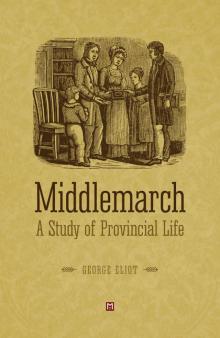 Middlemarch
Middlemarch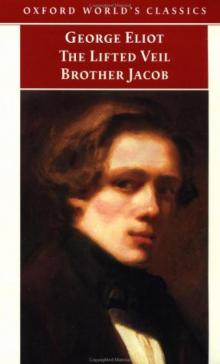 Brother Jacob
Brother Jacob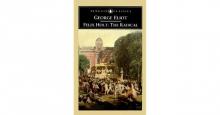 Felix Holt, the Radical
Felix Holt, the Radical Mr Gilfil's Love Story
Mr Gilfil's Love Story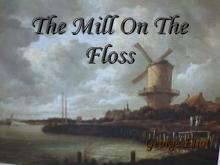 The Mill on the Floss
The Mill on the Floss Silas Marner
Silas Marner Adam Bede
Adam Bede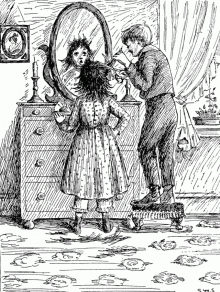 Tom and Maggie Tulliver
Tom and Maggie Tulliver The Damn Fool
The Damn Fool The Lifted Veil
The Lifted Veil Scenes of Clerical Life
Scenes of Clerical Life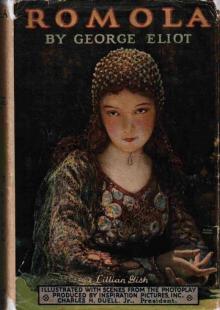 Romola
Romola Daniel Deronda
Daniel Deronda Felix Holt
Felix Holt